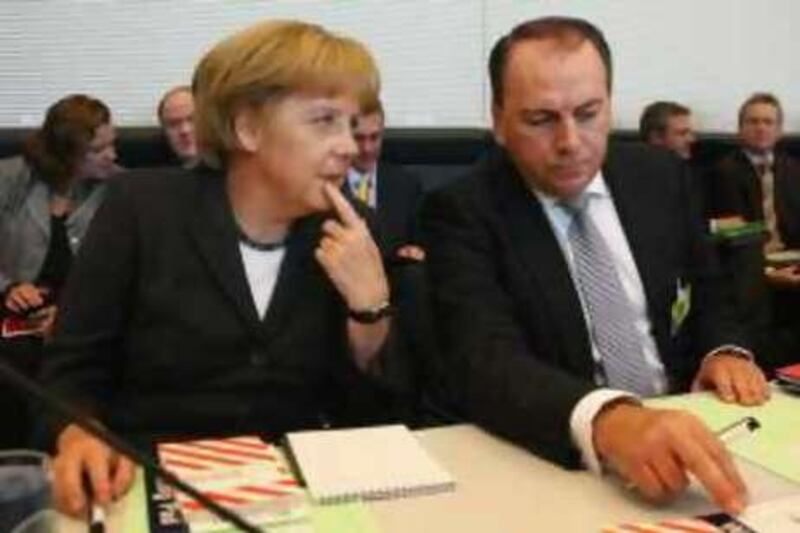BERLIN // Angela Merkel faces her toughest year yet as German chancellor after Sunday's regional election debacle in Bavaria, which has weakened her conservative power base ahead of general elections next September.
The sensational slump in support for her Bavarian allies in the Christian Social Union has put her on the defensive for the first time since she took office in 2005. Her approval ratings had soared in the past three years on an economic recovery and her strong performances on the world stage, but the Bavarian rout means her bid for a second term will now be harder than expected. The problems have been compounded by the global financial crisis, which forced her government to agree to a controversial rescue package for a leading German mortgage bank, Hypo Real Estate, last weekend. The government's exposure to the bailout could exceed ?26 billion (Dh137bn) and the deal has put the government's budget consolidation plans in doubt.
The CSU, the Bavarian sister party to Mrs Merkel's conservative Christian Democrats, is in turmoil after losing its absolute majority in the prosperous Alpine state for the first time in half a century. Erwin Huber, the CSU leader, resigned yesterday. Gunther Beckstein, the Bavarian governor, may also have to go. For decades, the CSU was as much a part of Bavaria's image as Lederhosen and the Alps, and it was always a reliable pillar of strength for conservative-ruled German governments. Mrs Merkel owes her own power to conservative strength in Bavaria that enabled her to win a slender majority in 2005.
"Since Sunday it's clear that the Alps and the Danube River may be essential parts of Bavaria, but the CSU isn't," a Bavaria-based daily newspaper, Süddeutsche Zeitung, wrote in an editorial yesterday. The CSU, whose support fell 17.3-percentage points to 43.4 per cent, will have to form a coalition government with a smaller partner, most likely the liberal Free Democrats, after having ruled the state on its own for more than 40 years.
The CSU lost its grip as a result of unpopular local spending cuts, controversial education reforms and a tepid election campaign that was not helped by the refusal of Mr Beckstein's wife, Marga, to wear a traditional dirndl dress at the opening of this year's Oktoberfest folk festival. Analysts also said Bavaria's voters had become tired of living in a one-party state, even though it consistently has the lowest unemployment and crime rates in the country.
"Merkel's party can only be strong if the CSU scores around 50 per cent in Bavaria. This result doesn't bode well for the general election," Dietmar Herz, who teaches political science at Erfurt University, said in an interview. "The setback is likely to influence the public's perception of the conservatives and that will have an effect during the election campaign in 2009." Leading CSU members, including Mr Beckstein, have said Mrs Merkel herself was partly to blame for Bavaria's political earthquake because she slapped down CSU demands for heavy nationwide tax cuts during the campaign.
A dejected-looking Merkel denied on Monday that her conservatives had been weakened, but added that her party would have to take more account of ordinary people's worries. "The priority must be to give people support in these times of globalisation," she told reporters, adding that she would focus her re-election campaign on the economy, job creation and education. Manfred Güllner, the director of the Forsa polling institute, said: "The election defeat in Bavaria will lead to a dip in nationwide sentiment for the conservatives. But it's far too soon to say what impact it will have on the next general election."
The rival centre-left Social Democrats, junior coalition partners in Mrs Merkel's power-sharing coalition, remained far weaker than the conservatives in opinion polls and were likely to share any blame for the financial crisis spilling over to Germany, Mr Güllner said. In the coming months, tensions within Mrs Merkel's coalition are likely to increase as the parties try to score points off each other ahead of the general election. Mr Huber's likely successor as CSU leader, Horst Seehofer, the agriculture minister, is also expected to be more confrontational towards Mrs Merkel as he tries to boost his own profile, analysts said.
"CSU members in Munich are saying they lost the election because they gave up some of their Bavarian identity," Prof Herz said. "The CSU may have become weaker, but it will also become a more uncomfortable partner for Merkel, because it must now try to regain its old supporters." Analysts said the Bavarian election had made it more likely that the next German government will be a repeat of the current coalition between the two main parties because neither of them will be strong enough to form an alliance with any of the smaller parties.
dcrossland@thenational.ae






